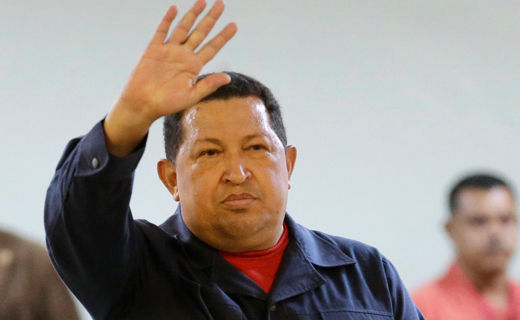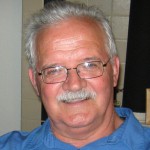
The powerful voice of Hugo Chavez – a voice for economic justice, democracy, empowerment, national independence, continental solidarity, peace, anti-imperialism, and socialism – has been stilled.
While local and global elites sigh in relief and belittle his life in the major media, the untimely death of Chavez is also evoking a heartfelt cry from millions of abused, marginalized, and exploited people across the globe – none more so than in Venezuela and throughout Latin America.
In that cry one doesn’t hear a note of despair and defeat, but rather an unmistakable affirmation that the irrepressible spirit, intellectual curiosity, and disposition to action that defined this man’s life will find reflection in the lives of struggling humanity in the years to come.
The celebrations in the seats of power of the global elite over Chavez’s death are very premature. The “masters of the universe” make the mistake of underestimating the consciousness and capacity of people in Venezuela and elsewhere to carry forward Chavez’s legacy of challenging entrenched capitalist power and injustice. This misunderstanding is not unusual for a class that is steeped in notions of racial superiority, patriarchy, and class entitlement, and tucked away in bubbles of privilege and opulence.
Few of us leave an individual imprint on history. For most of us, our ability to affect history lies in joining with others in collective action.
But some individuals do play an outsized role shaping historical events – as part of the wider struggles taking place in society.
Hugo Chavez Frias falls into this category.
He was an early and unyielding opponent of neoliberal globalization – a system of political and economic capitalist domination that grew out of the dynamics and contradictions of capitalism in its current stage of development. This system of governance broke up traditional farming in the countryside and forced vast numbers of peasants off the land. It created massive slums rimming South America’s major cities, rolled back social provisioning by the state, degraded the environment, generated ever wider inequalities, tore down trade and financial barriers protecting local economies, decimated and de-nationalized industry, and condemned millions to impoverishment and spiritual hopelessness.
Drawing inspiration from Simon Bolivar, Fidel Castro and other revolutionaries of Latin America, Chavez challenged in words and deeds this system of exploitation and oppression.
But his fight was not a lonely one. This great leader of indigenous and African descent (a fact that fueled the hatred of the elites even more) not only gave voice to the impoverished and rootless, but also inspired them to become political actors in their own right. Indeed, Chavez played a singular role in transforming a fragmented mass of people in Venezuela into an organized force challenging the profits and prerogatives of local and global capital.
If we left it here however, we would miss the other side of the dialectic. Chavez, like other great leaders, was as much a product of his times and the people he sought to influence as they were of him. Changing circumstances and an aroused people remade him as much as he remade them.
Chavez was a socialist, and one whose feet were very much in this century. While he was inspired by struggles of the past, he wasn’t a prisoner of the received wisdom of earlier times. His socialism – its sensibilities, goals, theory, program, and path – were conditioned by the particular, novel circumstances of the 21st century.
At the core of his worldview and political practice were people’s needs, people’s empowerment, and people’s unity at the national, regional, and global level. His politics grew out of the real movement of people and a sober estimation of the actual balance of class and social forces.
At times, his views raised the eyebrows of those on the left who considered problematic any deviation from what I would call their undialectical and rigid reading of Marxism.
In an interview with Tariq Ali, Chavez said,
“I don’t believe in the dogmatic postulates of Marxist revolution. I don’t accept that we are living in a period of proletarian revolutions. All that must be revised. Reality is telling us that every day. Are we aiming in Venezuela today for the abolition of private property or a classless society? I don’t think so. But if I’m told that because of that reality you can’t do anything to help the poor, the people who have made this country rich through their labor – and never forget that some of it was slave labor – then I say: ‘We part company.’ I will never accept that there can be no redistribution of wealth in society.
“Our upper classes don’t even like paying taxes. That’s one reason they hate me. We said: ‘You must pay your taxes.’ I believe it’s better to die in battle, rather than hold aloft a very revolutionary and very pure banner, and do nothing … That position often strikes me as very convenient, a good excuse … Try and make your revolution, go into combat, advance a little, even if it’s only a millimetre, in the right direction, instead of dreaming about utopias.”
As you can see, Chavez’s theory and practice included intermediate steps and stages of struggle. It embraced the struggle for reforms, even minor ones that would meet in some, even small, ways people’s needs, and at the same time act as a matrix for mass political participation, anti-capitalist education, and deeper and broader unity. And it rested on a creative and flexible application of theory to changing reality.
Hugo Chavez will be greatly missed in his home country and worldwide, but the way to honor him isn’t to turn him into an icon and his words into sacred texts. We honor Hugo Chavez by embracing his passion and courage, his curiosity about the world, his tireless struggle for unity of diverse forces, his readiness to think independently and develop Marxism in fresh and creative ways, and his belief in the intelligence and power of an engaged people.
Photo: Fernando Llano/AP


 Join Now
Join Now